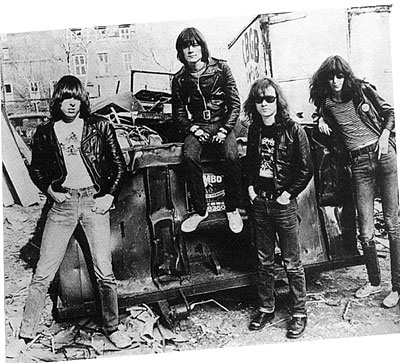Every discerning music lover at some point discovers and falls in love with The Ramones. There is something so primal and pure about the stripped-down arrangements, lightning fast songs, and goofy lyrics that is both cool and corny. The Ramones were the band that essentially started punk rock. Until their induction into the Rock & Roll Hall of Fame a few years ago, they were never given their due. They served as one of those bands that remained relevant and popular with succeeding generations, influenced a huge number of groups that went on to very big critical and financial success, and somehow always got the short end of the stick. End of the Century: The Story of the Ramones, is an engrossing look at the history of the band, and a self-examination of their successes and failures.
Co-directors Jim Fields and Michael Gramaglia ensure that non-fans can enjoy the movie just as well as fans can. They throw in a huge amount of information, and gives lots of screen time to performances and interviews. The Ramones came at a time when rock was beginning to stagnate. Everything was dull, soft, and commercialized. For four guys living in Queens, this was wrong. They were drawn together out of their love for the Stooges, and once the New York Dolls came about, they decided to start their own band. The reaction people had back then is pretty much the same reaction people have today. What the hell? Here are four guys dressed all in black with long bowl cuts. They sound like they can barely play, yet their enthusiasm is evident, and the music is strong. They look like thugs and their lyrics are extreme, but it is more out of satire than anything else.
The music industry hated them. Yet, The Ramones gained fans, especially in England, where they influenced bands like the Sex Pistols and The Clash. Soon they were able to sell out large venues everywhere except the US, where they were relegated to small clubs. Still, with their nonstop touring, they were able to inspire bands like the Cramps and the Dead Kennedys. Everywhere they went, they served as a symbol that the outcasts could become successful. While all this makes for good viewing, the real power behind End of the Century comes from Fields and Michael Gramaglia's extended interviews with each band member.
Part of what made the Ramones successful was their hatred of each other. Instead of splitting up, they funneled their frustrations into their music. Each person had unique and clashing personalities. Johnny Ramone (John Cummings) was the alpha male while on tour. He kept everybody in check and took care of the books, but had a very abrasive personality. He was not an easy person to be around. Original drummer Tommy Ramone (Tommy Erdely) was the studio mastermind, who ensured that the music had a consistent sound. Joey (Jeff Hyman) was the shy, lanky lead singer, whose personality developed more as he became accustomed to fame and began to assert himself after Tommy left. And finally Dee Dee (Douglas Colvin) was the loose cannon. He constantly battled drugs and alcohol, and at one point had a strange foray into rap.
Given the chance to look back, each member of the Ramones (including later additions Marky and CJ) has the opportunity with hindsight to reflect upon what happened. The largest strain came from a rift between Joey and Johnny, which lasted for years. Yet, by the time the Ramones broke up, they were the only original members still in the band. Every album they released was supposed to be the one that made them famous, even the one produced by Phil Spector that gives the film its name. While their sound was hard and brutal, their songs were actually catchy pop songs. How can people not smile after hearing "Sheena Is a Punk Rocker" and "Rock N Roll High School?" The Ramones deserve respect. They got some at the induction ceremony. Hopefully, this documentary will give them some more.
